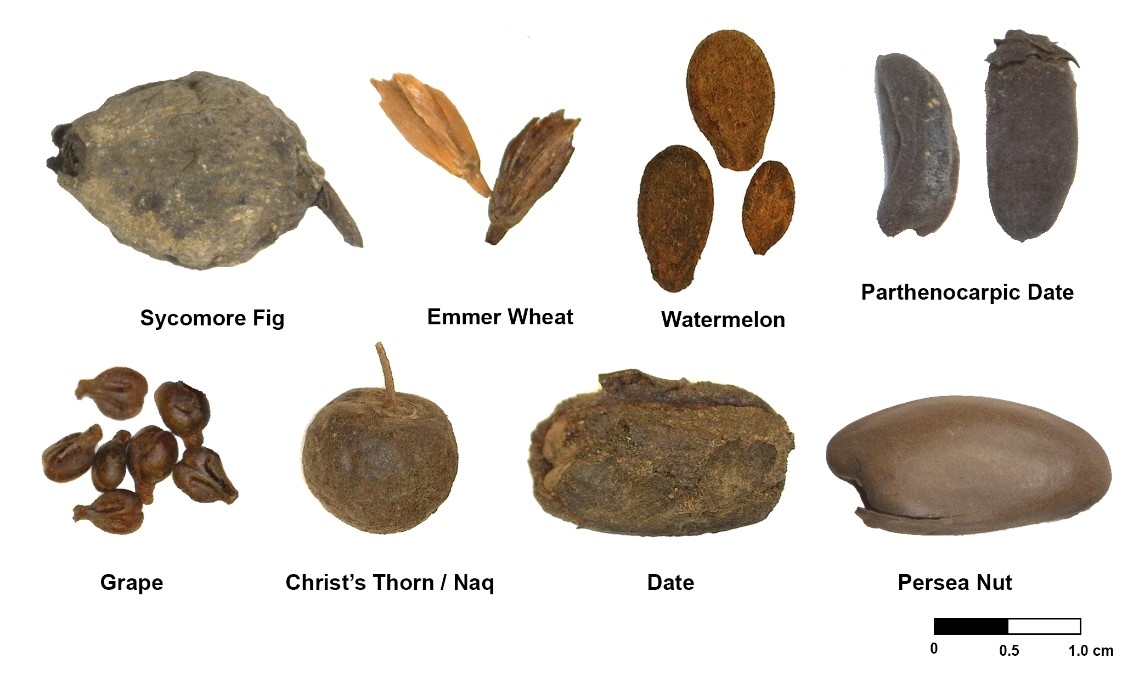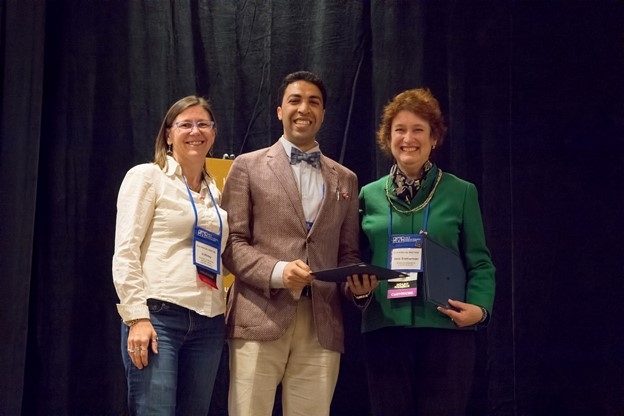Amr Shahat Research Lauded in International Media
Amr Shahat, PhD candidate at the Cotsen Institute of Archaeology, whose research paper won third prize from the American Research Center in Egypt during their 72nd annual meeting, has had his work lauded by multiple media outlets throughout Egypt and the Middle East.
His research, which includes parts of his dissertation, will also be published in archaeological journals, as well as by the French Institute of Oriental Archaeology in Egypt and the American University in Cairo. In addition, he had a paper on isotope ecology that was accepted by the 12th International Conference on the Applications of Stable Isotope Techniques to Ecological Studies, co-organized by the International Atomic Energy Agency and the Inter-University Center for Aquatic Ecosystem Research (WasserCluster Lunz). This conference was postponed due to the Covid-19 pandemic and will now be held in Gaming, Austria, in 2022.
“I am interested in writing the social history of common people in Egypt; those who do not have coffins and iconography and big decorations in their tombs,” Shahat said as he described his work. He approached this topic by looking at the use of plants in their diet, in their medical recipes, and in the trade system and cultural interaction they had with other people. “So I do not look for statues and treasures. I rather dig for what built the lives of these people and determined their health and culture. I investigate the importance of plant remains and what they can tell us in terms of social history, but also how those remains recorded the ancient climate and the environmental and water conditions in the region in which they grew,” he continued.
“This is an important lens to see the history of climate change and its impact on social structure, foodways, and health using unique deep-time datasets that scientists in NASA and FAO consider important for understanding current issues relating to climate change,” he continued. Officially, his work addressed the impact of climate change on the cultural management practices relating to food, water, and soil, and on social structure, by analyzing the carbon, nitrogen, and oxygen isotopic composition of ancient food remains that were recovered from ancient Egyptian tombs and settlements. He also built a stable isotope map of the Nile river, to serve future research by historians, anthropologists, and life scientists, highlighting the impact of climate change and damming of rivers.
According to the Arabic version of SkyNews-Arabia, located in Abu Dhabi, the work is “highly relevant to current water and food sustainability in the Nile and especially contributes to the current crisis of the impact of climate change and damming of rivers on food and water sustainability.” Their headline read: Egyptian researcher wins an international award…and warns of the danger of the Renaissance Dam. They interviewed Shahat and noted that “his research is based on the study of soil fertility and water cycle in the era of the Ancient Egyptians compared to the current era, as it proved the quality of soil and water from the Nile in Ancient Egypt and the lack in (today’s) water (of) many useful elements as a result of climate change, environmental pollution, and the large number of dams built around the waters of the Nile river.”
A video on the Almohtawa channel covering Sahat’s research had more than 2.1 million views. This also included a warning about the impact of dams on the isotopic composition and oxygen cycle of the Nile and how this endangers riverine species. Additional articles spoke of “significant contribution to other sciences, including climate change sciences, food sciences, and public health, suggesting solutions to current issues inspired from the past.”
Shahat described the history of his research to Arabia.Net: “The beginning of the search was that I analyzed an old loaf of bread from the temple of Mentuhotep II next to Hatshepsut’s temple, placed as food offering in the foundation deposit of the temple. Currently the loaf of bread is in the Museum of Arts of the University of Memphis. When I researched it, the loaf was rich in fiber, and it had a nutritional value that far exceeds the nutritional value present in today’s bread. In addition to that, the size of the wheat grain was larger and included wheat species that do not exist in today’s diet. This motivated my further investigation,” Shahat said. “In my search on plant biodiversity at the time of Ancient Egyptians, I discovered the existence of wheat species, as well as many other plants, that no longer exist due to two factors. The first is climate change impact on plant biodiversity and the increase in the temperature as a consequence of global warming. The second factor is the decreased fertility of the soil impacted by the dams along the river. Even if some species still exist, the nutritional value of these plants that constitute our diet and shape our health in modern time is much lower than the past,” he explained.
 Photograph of ancient plant species biodiversity from the site of Deir al-Ballas, Egypt. Some species are alarmingly decreasing, such as persea and sycomore fig.
Photograph of ancient plant species biodiversity from the site of Deir al-Ballas, Egypt. Some species are alarmingly decreasing, such as persea and sycomore fig.
His study identified differences between ancient and modern plants based on the stable isotopic composition of carbon, which reveals the climate and water availability in the ancient environment in which the plant was grown; whether it was in a period of drought or a period of abundance of water.
Shahat’s research showed that dams across the river threaten the water of the entire Nile, as well as the plants dependent on it. He stresses that before we divide over whose share is what from the river water, we should unite over what the river's life cycle requires from us. “Dams threaten the life that depends completely on the Nile because the dams lead to poor water flow, altering the oxygen isotopic composition and the life cycle of the river, in addition to contributing to the spread of noxious algae” he said.
His award-winning research was also featured on Extra News: Egypt; a 4 1/2-minute piece on Mohtawa TV: Dubai; and the website of Masr News: Egypt, and Cairo 24 News. From Elwatan News: “The Egyptian researcher feels very proud to represent his country and its people abroad, especially since he won first place in the same conference in 2018 for his research on how to discover ancient plants and their scientific significance using nanosciences and biological sciences,” Although this year he received a third-place prize for his research, it received considerably more attention than his first place prize in 2018 because of the high relevance of the topic to current issues and to contributing to solving a crisis in a way that unites rather than divides cultures.

Amr Shahat receives the first place poster award in 2018, in Tucson, Arizona, from J. J. Shirley (left) and Jane Zimmerman of the American Research Center in Egypt.
Susan Ettner, interim dean of graduate education at UCLA, has also acknowledged Shahat for his achievement, saying: “Congratulations on your recent award at the 72nd Annual Meeting of the American Research Center in Egypt! Your paper, ‘Social History of Food in Ancient Egypt: Between Humanities and Life Sciences,’ is an excellent example of interdisciplinary research with the potential to make a real difference in the world.”
He was commended by Aradhna Tripati of the Institute of the Environment and Sustainability at UCLA for receiving the award and for his research relevant to current water and food sustainability in the Nile. Shahat noted that he considers the congratulations from Tripati’s laboratory a huge honor, “as she is one of the leaders in paleoceanography, and her use of advanced stable isotope methods to address climate change and sustainability issues comes from an equity and social justice perspective. My whole purpose is to derive benefits from ancient plant materials to provide solutions to current issues and inspire future younger scientists,” Shahat added.
He also received acknowledgment from Suzanne Onstine, associate professor of Egyptology and Ancient History at the University of Memphis and a contributor to the UCLA Encyclopedia of Egyptology. She commented that “most researchers contribute with new data, but Amr developed whole new methods of how to find these data in ways that contribute to Egyptology and life sciences.” Shahat worked with Onstine as an archaeology team member in the field on the Theban tomb of Panehsy, doing research on paleoethnobotany and paleodietary analysis from teeth and hair remains for diet and health reconstruction of the population buried in the tomb.
“I am most appreciative that my colleagues and other scientists can use my findings to advance their research and our collective knowledge within the sciences and humanities. I am so honored and grateful for the support of the Cotsen Institute of Archaeology and the collaboration between UCLA and UC Berkeley in my training,” he explained. In addition to his years at the Cotsen Institute, Shahat had studied at Berkeley in their paleoethnobotany and stable isotope laboratories during the fall 2018 and spring 2019 terms through the University of California Intercampus Exchange Program.
After completing his PhD this spring, he plans to continue working at excavations in Egypt, and he hopes “to continue to work in partnership with the broad scientific community, as well as to strengthen the collaborative efforts between the United States and Egypt.”
Examples of the international news coverage
Sky news: United Kingdom: the Arabic version: https://www.skynewsarabia.com/technology/1433347-باحث-مصري-يحصد-جائزة-عالمية-ويحذر-خطورة-سد-النهضة
Extra News: Egypt: https://youtu.be/CwI7oe002tc
Mohtawa TV: Dubai: https://fb.watch/5duAGhzwc_/
Masr News: Egypt: https://www.almasryalyoum.com/news/details/2320413
National TV and articles in Egypt: https://m.elwatannews.com/news/details/5463391
For information on how to support our research and education in archaeology and conservation, please contact Michelle Jacobson at mjacobson@ioa.ucla.edu.
Published on May 26, 2021.


